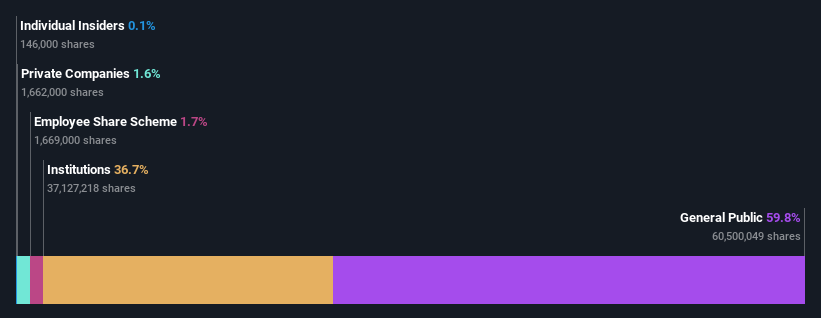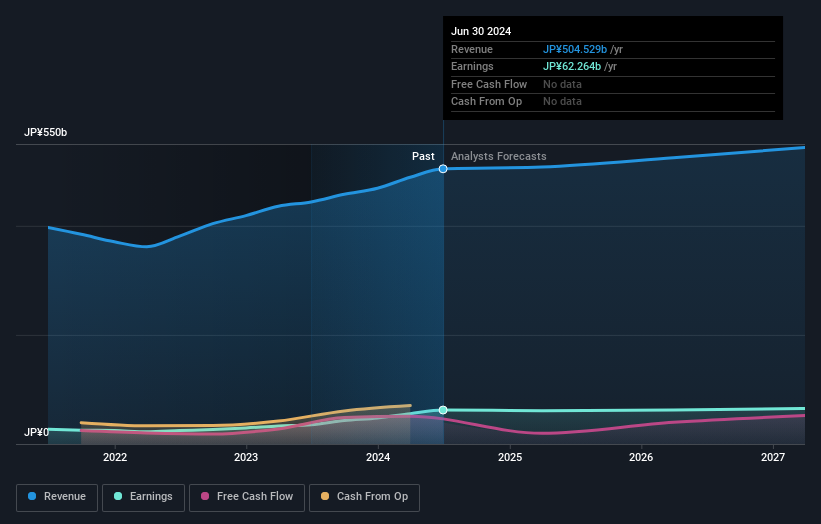Painful week for individual investors invested in Toyo Suisan Kaisha, Ltd. (TSE:2875) after 5.7% drop, institutions also suffered losses

Key Insights
- The considerable ownership by individual investors in Toyo Suisan Kaisha indicates that they collectively have a greater say in management and business strategy
- 37% of the business is held by the top 25 shareholders
- Institutional ownership in Toyo Suisan Kaisha is 37%
To get a sense of who is truly in control of Toyo Suisan Kaisha, Ltd. (TSE:2875), it is important to understand the ownership structure of the business. The group holding the most number of shares in the company, around 60% to be precise, is individual investors. That is, the group stands to benefit the most if the stock rises (or lose the most if there is a downturn).
While institutions who own 37% came under pressure after market cap dropped to JP¥887b last week,individual investors took the most losses.
Let's delve deeper into each type of owner of Toyo Suisan Kaisha, beginning with the chart below.
See our latest analysis for Toyo Suisan Kaisha

What Does The Institutional Ownership Tell Us About Toyo Suisan Kaisha?
Institutions typically measure themselves against a benchmark when reporting to their own investors, so they often become more enthusiastic about a stock once it's included in a major index. We would expect most companies to have some institutions on the register, especially if they are growing.
We can see that Toyo Suisan Kaisha does have institutional investors; and they hold a good portion of the company's stock. This implies the analysts working for those institutions have looked at the stock and they like it. But just like anyone else, they could be wrong. It is not uncommon to see a big share price drop if two large institutional investors try to sell out of a stock at the same time. So it is worth checking the past earnings trajectory of Toyo Suisan Kaisha, (below). Of course, keep in mind that there are other factors to consider, too.

Toyo Suisan Kaisha is not owned by hedge funds. Massachusetts Financial Services Company is currently the largest shareholder, with 7.0% of shares outstanding. In comparison, the second and third largest shareholders hold about 3.9% and 3.9% of the stock.
Our studies suggest that the top 25 shareholders collectively control less than half of the company's shares, meaning that the company's shares are widely disseminated and there is no dominant shareholder.
While it makes sense to study institutional ownership data for a company, it also makes sense to study analyst sentiments to know which way the wind is blowing. Quite a few analysts cover the stock, so you could look into forecast growth quite easily.
Insider Ownership Of Toyo Suisan Kaisha
The definition of company insiders can be subjective and does vary between jurisdictions. Our data reflects individual insiders, capturing board members at the very least. The company management answer to the board and the latter should represent the interests of shareholders. Notably, sometimes top-level managers are on the board themselves.
Most consider insider ownership a positive because it can indicate the board is well aligned with other shareholders. However, on some occasions too much power is concentrated within this group.
Our information suggests that Toyo Suisan Kaisha, Ltd. insiders own under 1% of the company. However, it's possible that insiders might have an indirect interest through a more complex structure. It's a big company, so even a small proportional interest can create alignment between the board and shareholders. In this case insiders own JP¥1.3b worth of shares. It is good to see board members owning shares, but it might be worth checking if those insiders have been buying.
General Public Ownership
The general public, who are usually individual investors, hold a substantial 60% stake in Toyo Suisan Kaisha, suggesting it is a fairly popular stock. With this amount of ownership, retail investors can collectively play a role in decisions that affect shareholder returns, such as dividend policies and the appointment of directors. They can also exercise the power to vote on acquisitions or mergers that may not improve profitability.
Next Steps:
It's always worth thinking about the different groups who own shares in a company. But to understand Toyo Suisan Kaisha better, we need to consider many other factors.
I like to dive deeper into how a company has performed in the past. You can find historic revenue and earnings in this detailed graph.
But ultimately it is the future, not the past, that will determine how well the owners of this business will do. Therefore we think it advisable to take a look at this free report showing whether analysts are predicting a brighter future.
NB: Figures in this article are calculated using data from the last twelve months, which refer to the 12-month period ending on the last date of the month the financial statement is dated. This may not be consistent with full year annual report figures.
Valuation is complex, but we're here to simplify it.
Discover if Toyo Suisan Kaisha might be undervalued or overvalued with our detailed analysis, featuring fair value estimates, potential risks, dividends, insider trades, and its financial condition.
Access Free AnalysisHave feedback on this article? Concerned about the content? Get in touch with us directly. Alternatively, email editorial-team (at) simplywallst.com.
This article by Simply Wall St is general in nature. We provide commentary based on historical data and analyst forecasts only using an unbiased methodology and our articles are not intended to be financial advice. It does not constitute a recommendation to buy or sell any stock, and does not take account of your objectives, or your financial situation. We aim to bring you long-term focused analysis driven by fundamental data. Note that our analysis may not factor in the latest price-sensitive company announcements or qualitative material. Simply Wall St has no position in any stocks mentioned.
About TSE:2875
Toyo Suisan Kaisha
Produces and sells food products in Japan and internationally.
Very undervalued with flawless balance sheet and pays a dividend.

